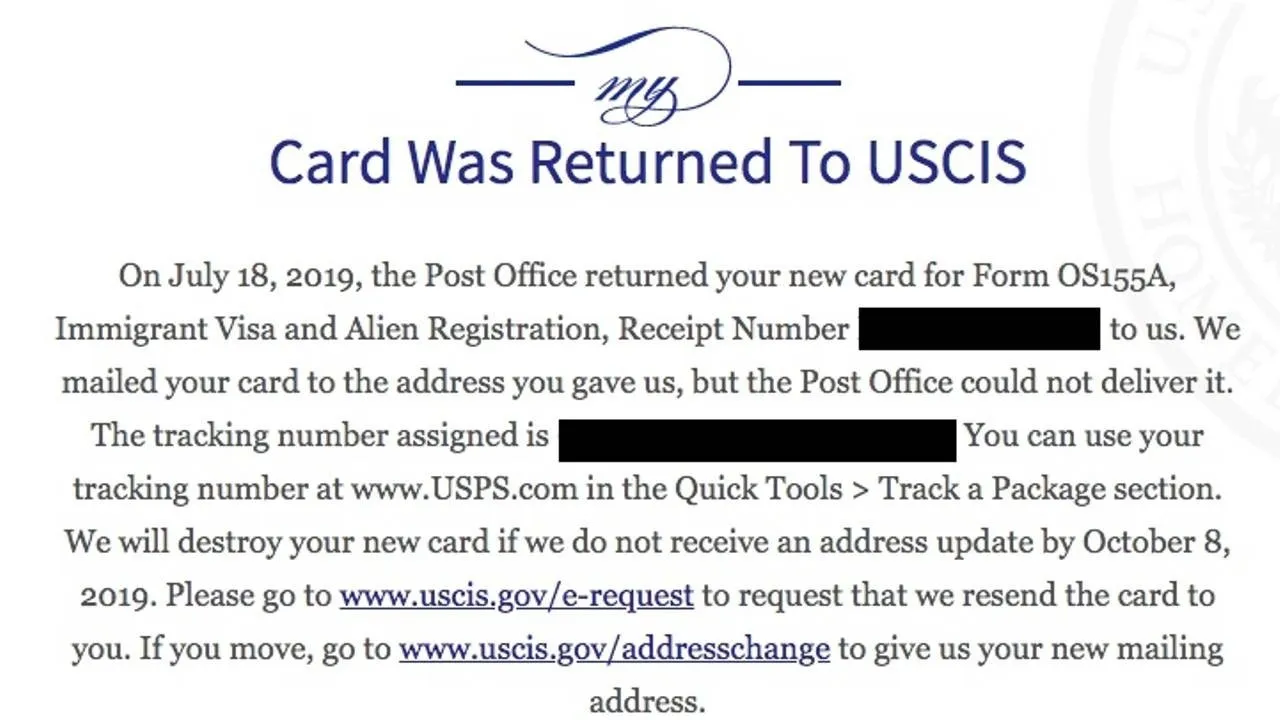After a year and a half of waiting, you’ve finally reached the finish line: Your green card is being produced! The end is in sight and you think that you’ve made it over the final hurdle, until… your card does not arrive in the mail. You check your case status and it confirms the card was delivered, but you did not receive it. What now?
One of the worst things that can happen during the course of an immigration case is to run into additional problems or delays caused by another massive federal agency: The United States Postal Service. Unfortunately, this is not an uncommon occurrence.
When you apply for an immigrant benefit, it is extremely important to have a reliable place to receive mail and to notify USCIS immediately if you move to a new address. Every milestone that will occur after you file your case will involve something being mailed to you: your receipt notice acknowledging that your case was received successfully, your biometrics appointment notice with the date and time of your appointment, a Request for Evidence (RFE) if something is missing, interview appointment notice(s), approval notice(s), and, finally, the immigration document (green card, visa, etc.).
Unfortunately, due to the current state of things at USCIS, even providing a reliable address to USCIS or submitting a Change of Address promptly does not guarantee that your mail and documents will make it to you.
In recent months, more and more notices are being sent to an incorrect or old address, and more green cards are being returned to USCIS as undeliverable. This increase in returned cards in part due to an April 2018 policy change which requires that Permanent Resident cards (green cards), Employment Authorization Documents, and Travel booklets be mailed via secure mailing services which require ID and/or signature for delivery. According to USCIS, “Signature Confirmation Restricted Delivery increases the security, integrity, and efficiency of document delivery [and] provides better tracking and accuracy of delivery information, improving service to applicants.”
While this system has good intentions, in many cases, it is causing USPS to immediately return coveted green cards and EADs to USCIS processing centers when they cannot verify the delivery address. The imperfect system often causes cards to be sent back even when the address they had was correct.
To make matters worse, USCIS notoriously does not process Change of Address submissions adequately throughout their system, so many times the message does not get through to the facilities who produce and mail the cards. There is no guarantee that if you submit a Change of Address by phone, mail, or online that your mail will be sent to the right place, even if USCIS confirms that they have updated your address.
So what can you do given these dismal circumstances?
While there is no surefire way to avoid potential issues with USCIS and USPS, there are a few things you can do to increase your chances of receiving USCIS mail consistently and reliably:
- Provide a reliable, permanent address on all USCIS forms when submitting your packet. Make sure you correctly list your physical address and your mailing address, if they are different.
- Do not move for the duration of your case unless you absolutely have to. If you do move, submit your Change of Address (AR-11) online and by mail within 10 days.
- Hire an attorney and select the boxes on Page 3 of Form G-28 to have all important notices, documents, and cards mailed to the law firm’s secure address. This is a good option if you do not have secure mail at your address or if you suspect you will need to move before your case is finalized.
- Complete the Postal Service’s PS Form 3801, Standing Delivery Order or PS Form 3801-A, Agreement by a Hotel, Apartment House, or the Like so that someone else in your household is authorized to sign for your mail when you are not home.
- Sign up for USPS Informed Delivery to receive delivery status notifications via email and, if necessary, arrange to have your mail held at the post office for pickup.
- If you are considering moving out of state, notify your immigration attorney to confirm if any issues might arise. In some cases, you may want to consider maintaining a local address or having mail sent to your attorney or to a relative to avoid additional delays with your case.







